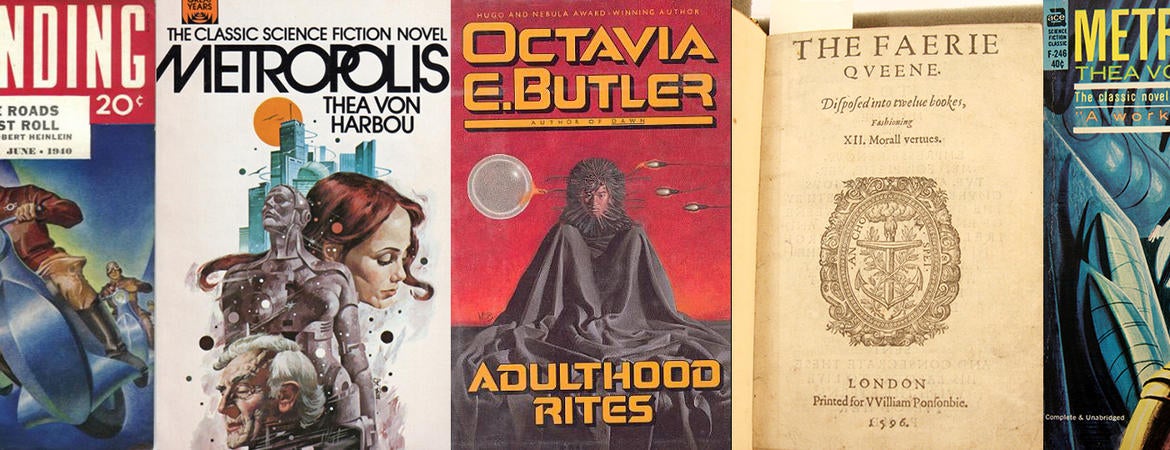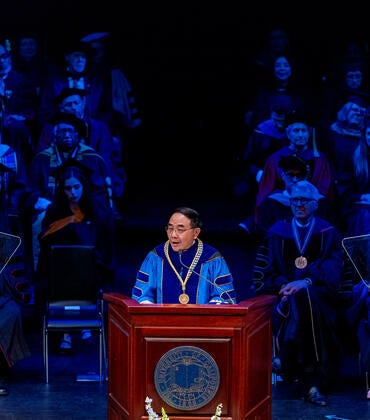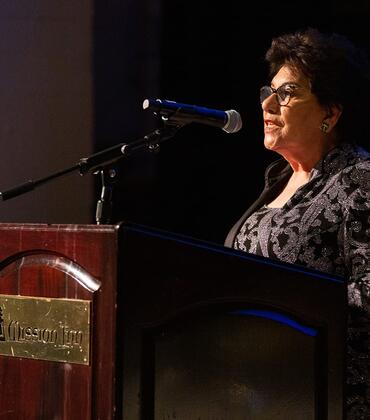
The University of California, Riverside, is the nucleus of science fiction.
This year, the Eaton Collection of Science Fiction and Fantasy, a world-renowned science fiction archive, celebrates its 50thanniversary. The collection currently has more than 300,000 pieces of science fiction, fantasy, horror, and utopian literature, making it one of the largest collections of its kind in the world. When it was acquired in 1969, the collection included 7,500 hardback publications.
To commemorate its half century, the fourth floor of the Tomás Rivera Library will showcase an exhibit titled “50 Books for 50 Years,” along with a wall-mounted timeline highlighting award-winning publications or books that are representative of a particular genre. The exhibit, located in Special Collections, opens Jan. 22 and runs through May 31; throughout those weeks, a selection of the 50 books will be rotated until all 50 have been showcased. The exhibit is free and open to the public.
“It was a difficult choice, but we hope people see their favorites and also hope that visitors will find new treasures,” said Cherry Williams, director of distinctive collections within UCR Library’s Special Collections and University Archives. Encompassing a spectrum of writings, from John Milton’s utopia to contemporary alternative futurisms, the Eaton Collection items were chosen by JJ Jacobson, the Jay Kay and Doris Klein Science Fiction librarian; and Andrew Lippert, the Special Collections processing archivist.
A seating area by the exhibit will allow visitors to browse through some examples of materials that duplicate items held in the Eaton Collection. Visitors also have the option to sign in as readers and request items not on display. Material from Special Collections can only be borrowed within Special Collections and may not be checked out of the library.
When it was acquired in 1969 from J. Lloyd Eaton, a Berkeley physician and avid sci-fi book collector, his personal library primarily included science fiction, fantasy, and horror editions from the 19th and 20th centuries. Now the shelves include first editions of works such as Mary Shelley’s “Frankenstein” (1818), Bram Stoker’s “Dracula” (1897), and H.G. Wells’ “The Time Machine” (1895).
The Eaton Collection inspires out-of-the-box thinking in students and faculty across campus, said Steven Mandeville-Gamble, UCR’s university librarian.
“The Eaton Collection supports a wide variety of faculty and students, not only in the College of Humanities and Social Sciences, but also faculty in the School of Medicine, faculty in Materials Science and Engineering, and more, who use the collection to explore alternate ways to treat the body, create super strong materials, and solve real-world problems,” Mandeville-Gamble said.
In the exhibit visitors will see items such as:
- 1596 copy of “The Faerie Queene” by Edmund Spenser
- 1955 copy of “The Magazine of Fantasy and Science Fiction” by Theodore Sturgeon
- 1961 copy of “The Ship Who Sang” by Anne McCaffrey
- 1964 copy of “Labyrinths: Selected Stories and Other Writings” by Jorge Luis Borges
- 1969 copy of “The Last Unicorn” by Peter S. Beagle
- 1975 copy of “The Female Man” by Joanna Russ
- 1988 copy of “Adulthood Rites” by Octavia Butler
The 50-book list also has more recent titles, including Ted Chiang’s “Stories of your Life and Others,” Nnedi Okorafor’s “Binti,” and “The Salt Roads” by Nalo Hopkinson, a professor of creative writing at UCR.
The Eaton Collection also includes bilingual publications, more than 50,000 science fiction-themed comic books, and over 75,000 fanzines — amateur magazines written and produced by sci-fi enthusiasts.
It’s this assortment of literature that makes the Eaton Collection so unique, Williams said.
“Part of the magnitude of the Eaton Collection, in addition to its size, is that it allows people to think in such broad, deep, and nuanced ways when exploring their personal as well as their research interests,” Williams said. “Exploring the Eaton Collection may enable you to think about it in previously unimagined ways.”
Visit the Eaton Collection website for more information. The collection is open Monday through Friday from 11 a.m. – 4 p.m.



